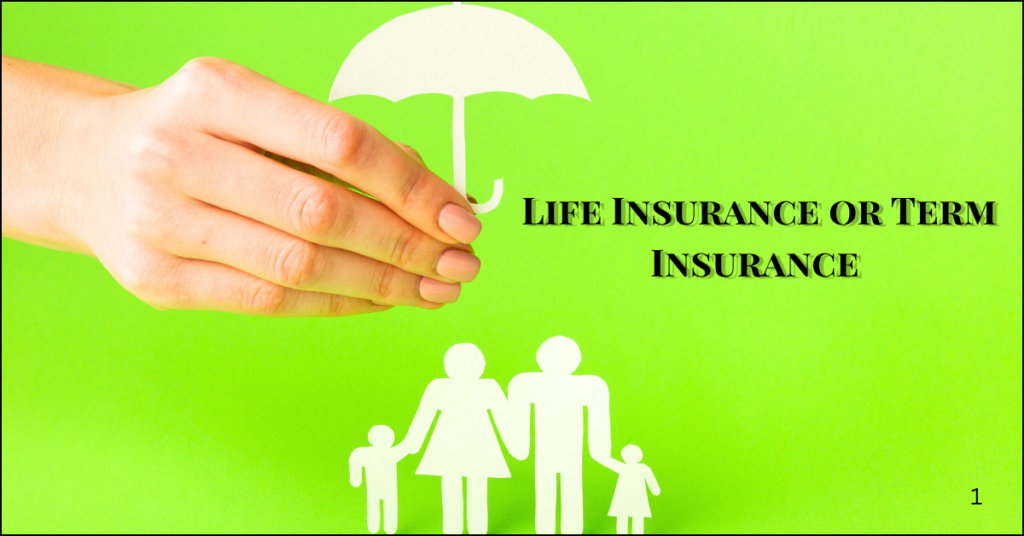The terms life insurance and term insurance are commonly used while discussing insurance. While giving loved ones financial security is the main goal of both kinds, their form, length, perks, and costs vary greatly. Understanding the salient characteristics, advantages, and disadvantages of each option is crucial for making an informed choice. This thorough information will assist you in making an informed comparison between term and life insurance.
What is Life Insurance?
A long-term insurance policy intended to cover the policyholder for the duration of their life, life insurance is sometimes known as whole life insurance or permanent life insurance. Life insurance plans, in contrast to term insurance, offer ongoing coverage as long as payments are paid; they do not expire after a certain amount of time.
Key Features of Life Insurance
- Permanent Coverage: Life insurance policies remain active for the policyholder’s lifetime, ensuring a payout whenever the insured passes away.
- Cash Value Accumulation: Many life insurance policies include a savings component that accumulates cash value over time, which can be borrowed against or used to pay premiums.
- Premium Stability: Life insurance premiums are typically higher than term insurance premiums but remain stable throughout the life of the policy.
- Higher Cost: Due to the cash value component and the permanent nature of coverage, life insurance premiums are often significantly higher than term insurance.
Benefits of Life Insurance
- Lifetime Coverage: Provides a guaranteed payout, ensuring long-term financial support for beneficiaries.
- Wealth Building: The cash value grows tax-deferred and can be utilized as a financial resource.
- Premium Consistency: Premiums are typically fixed, allowing policyholders to plan their expenses with greater certainty.
- Tax Advantages: Beneficiaries often receive the death benefit without income tax, and the cash value grows tax-deferred.
Drawbacks of Life Insurance
- Higher Premiums: Due to lifelong coverage and cash accumulation, premiums can be quite high.
- Complexity: Whole life policies may have complex structures and terms, which can be confusing for some buyers.
- Lower Returns on Investment: Compared to other investment options, the returns on the cash value of a life insurance policy are often lower.
Read Also: Tata AIA Term Plan Online: 10 Tips for Optimizing

What is Term Insurance?
Term insurance, often known as term life insurance, is a kind of life insurance that offers protection for a predetermined amount of time, like 10, 20, or 30 years. Beneficiaries get a death benefit if the policyholder passes away within the policy’s term. Nevertheless, no payment is made if the period expires and the insured is still alive.
Key Features of Term Insurance
- Limited Coverage Period: Term insurance only provides protection for a set period, making it ideal for short-term needs.
- No Cash Value: Unlike whole life policies, term insurance has no cash value component.
- Lower Premiums: Term insurance premiums are generally lower than whole life premiums, making it a more affordable option.
- Simple Structure: The structure is straightforward, focusing purely on coverage without savings or investment components.
Benefits of Term Insurance
- Affordability: With its lower premiums, term insurance is accessible to those who want coverage without a significant financial commitment.
- Flexible Term Options: Allows policyholders to choose coverage durations based on specific financial needs or life stages.
- Simple Policy Structure: Straightforward and easy to understand, making it an ideal option for those who need temporary coverage.
- Convertible Options: Many policies allow for conversion to permanent life insurance without a medical exam.
Drawbacks of Term Insurance
- No Cash Value: Term insurance offers no investment component, meaning there is no value if the policyholder outlives the term.
- Higher Premiums for Older Applicants: The cost of term insurance can increase significantly with age or renewal.
- No Lifetime Coverage: Once the term ends, so does the coverage, leaving beneficiaries without a death benefit if the policyholder outlives the policy.
How to Compare Life Insurance and Term Insurance
1. Purpose of Coverage
Think about the coverage’s goal while choosing a policy. For people who desire a guaranteed payment plus a cash value component often utilized as a savings tool life insurance is the ideal option. Term insurance is appropriate for those with certain financial objectives or obligations, such repaying a mortgage or replacing income during the years spent raising children.
2. Cost and Affordability
- Life Insurance: Due to the permanent nature and added benefits, life insurance premiums tend to be higher. It’s ideal for individuals with a long-term view of financial security.
- Term Insurance: Typically much more affordable, especially for younger buyers, term insurance is a budget-friendly option for those needing high coverage at a low cost.
3. Policy Duration
If you need coverage for a set amount of time, such until your mortgage is paid off or your kids are financially independent, go with term insurance. Life insurance is appropriate for people who wish to support their family indefinitely because it provides lifetime coverage.
4. Cash Value Considerations
The only insurance that provides a cash value component that increases over time tax-deferred is life insurance. This cash value may be used as a financial asset to supplement retirement income and provide flexibility through lending choices.
5. Flexibility and Conversions
Think about term insurance with a conversion option if you’re not sure if you need lifetime coverage. For individuals who begin with a less expensive term policy, this provision offers flexibility by enabling policyholders to transition to permanent insurance at a later time without having to pass a new medical examination.
Life Insurance vs. Term Insurance: Which is Right for You?
The choice between life insurance and term insurance depends on your financial goals, family situation, and budget.
- Life Insurance: Suitable for individuals seeking permanent coverage and the ability to build cash value. It’s often favored by those looking for a combination of protection, wealth building, and tax-deferred savings.
- Term Insurance: Ideal for younger families or those with temporary financial needs, such as covering debts, mortgage payments, or income replacement during critical years.
Common Questions about Life Insurance and Term Insurance
What happens if I outlive my term insurance policy?
A term insurance policy’s coverage terminates and there is no payout if you outlive it. Even if the initial cost is higher, certain policies may offer a return of premium option, which allows you to get a portion of your premiums back.
Is it possible to change my term insurance policy to a life policy?
You can switch to permanent life insurance without undergoing a medical examination thanks to the conversion function offered by many term policies. However, depending on your age at conversion, you might have to pay higher premiums.
Is life insurance a good investment?
The main purpose of life insurance is protection, not investment. Although it allows for the growth of monetary value, other investment vehicles frequently yield larger returns. If you appreciate the assured growth and the tax-deferred savings component, it can be advantageous.
Which is better: life insurance or term insurance?
The decision is based on your needs; none is intrinsically superior. While term insurance is great for reasonably priced, short-term coverage, life insurance is best for long-term protection and wealth accumulation.
Conclusion: Life insurance and tern insurance
When deciding between life insurance and term insurance, it’s essential to assess your financial goals, budget, and personal preferences. Life insurance provides lifelong coverage and savings, making it suitable for those with a long-term perspective on financial security. Term insurance, with its lower premiums and fixed-term structure, is ideal for individuals seeking temporary protection.
Both life insurance and term insurance offer valuable benefits, but the right choice depends on your unique financial circumstances and objectives. Life insurance provides lifelong coverage, cash value accumulation, and investment opportunities, making it ideal for individuals seeking a comprehensive, long-term financial solution. Term insurance, on the other hand, is more affordable, offering straightforward, temporary protection for a fixed period, which can be ideal for covering specific financial obligations.








Awesome
Awesome
Very good
Awesome
Very good
Good
Good information provides life insurance and term life insurance.
Good guidance
Subscribed Can’t wait to read your next post.
Thanks for this post! Ive been struggling to understand this area until now.
Fantastic post! I learned so much from this article thank you for sharing such valuable insights.
Clear explanation. Thanks for share
This article got me thinking how do others approach this?
That last point deserves its own blog post so powerful.
This is one of the most helpful blog posts I’ve read recently.
Loved how you combined data with personal insights it feels balanced.
Great job! The visuals you included made it even more engaging.